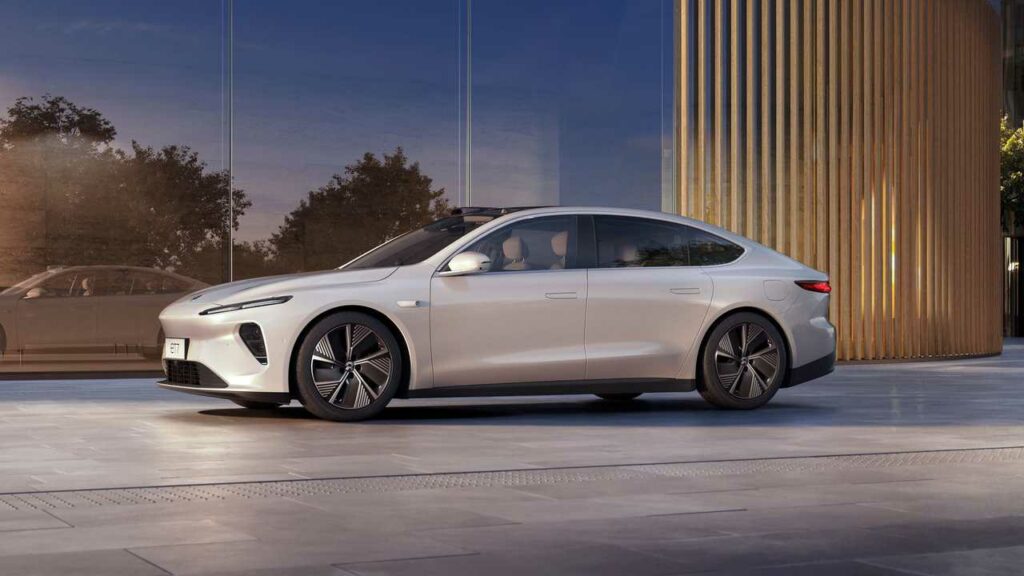Introduction
Electric vehicle market is expected to grow rapidly in the coming years, with an increasing demand for sustainable transportation, and government support in the form of regulations and incentives.
According to various market research reports, global electric vehicle sales are expected to reach around 31 million by 2025 and 56 million by 2040.
Companies like Tesla, NIO, and XPeng have seen significant growth in sales in recent years, especially in China and Europe.
Some of the leading electric vehicle manufacturers are targeting to increase their production capacity and expand to new markets to meet the growing demand for electric vehicles.
Let’s breakdown the EV Manufacturer and EV Charging companies, EV market growth projections, risks of investing in the EV stocks, advantages and disadvantages of the Electric Vehicles and largest EV markets in the world.
What are the top publicly traded EV manufacturing companies?
Tesla (NASDAQ:TSLA)

Tesla, Inc. was founded in 2003, designs, develops, manufactures, and sells electric vehicles, and energy generation and storage systems. It provides a range of electric vehicles such as Model S, Model 3, Model X, Model Y, Cybertruck, and Roadster. Tesla also provides energy storage systems, solar products, and energy services to residential and commercial customers.
NIO (NYSE:NIO)

NIO Inc. was founded in 2014, designs, manufactures, and sells electric vehicles in the People’s Republic of China. The company offers a range of electric SUVs such as the ES8, ES6, and EC6, as well as battery swapping services and other energy services.
Li Auto (NASDAQ:LI)

Li Auto Inc. was founded in 2015, designs, develops, manufactures, and sells smart electric vehicles in the People’s Republic of China. The company offers an extended-range electric SUV called Li ONE.
XPeng (NYSE:XPEV)

Xpeng Inc. was founded in 2014, designs, develops, and sells smart electric vehicles in the People’s Republic of China. The company offers electric sedans and SUVs such as the G3, P7, and the Xpeng P5.
Nikola Corporation (NASDAQ:NKLA)
Nikola Corporation was founded in 2015, designs and manufactures electric vehicles, electric vehicle drivetrains, and hydrogen fueling station infrastructure. The company operates a network of hydrogen fueling stations and offers a range of electric and hydrogen-electric semi-trucks such as the Nikola One, Nikola Two, Nikola Tre, and Nikola Badger.
Workhorse Group Inc. (NASDAQ:WKHS)
Workhorse Group Inc. was founded in 1998, designs, manufactures, and sells electric battery-powered delivery and utility vehicles, and aircraft in the United States. The company provides medium-duty and heavy-duty electric trucks such as the N-GEN, W-15, and C-650, as well as drones for package delivery.
Rivian Automotive Inc. (NASDAQ:RIVN)

Rivian Automotive Inc. was founded in 2009, designs, develops, and manufactures electric adventure vehicles. The company offers electric trucks and SUVs such as the Rivian R1T, R1S, and Adventure Van.
Fisker Inc. (NYSE:FSR)
Fisker Inc. was founded in 2007, designs and develops electric vehicles and advanced mobility solutions. The company provides electric SUVs and sedans such as the Fisker Ocean and Fisker EMotion.
Lucid Motors (NASDAQ:LCID)

Lucid Motors, Inc. was founded in 2007, designs and manufactures electric vehicles. The company provides electric sedans and SUVs such as the Lucid Air and Lucid GT.
Lordstown Motors (NASDAQ:RIDE)
Lordstown Motors Corp. was founded in 2019, designs, develops, manufactures, and sells electric trucks for commercial fleet use in the United States. The company offers an all-electric pickup truck called the Lordstown Endurance.
Canoo Holdings Inc. (NASDAQ:GOEV)

Canoo Holdings Inc. was founded in 2017, designs and develops electric vehicles and electric vehicle drivetrains for the consumer and commercial markets. The company offers a range of electric vehicles such as the Canoo Delivery Van and Canoo MPD Platform.
What are the top publicly traded EV charging companies?
Blink Charging Co. (NASDAQ:BLNK)

Blink Charging Co. was founded in 2009, owns, operates, and provides electric vehicle charging equipment and networked EV charging services.
The company designs, manufactures, sells, and installs EV charging equipment, and operates a cloud-based software platform that manages the operation and maintenance of EV charging stations and networks.
The company operates one of the largest networks of EV charging stations in the United States, with more than 20,000 charging points across 50 states, the District of Columbia, and Canada.
Blink’s charging stations are compatible with all EV makes and models and are available in various sizes and power levels.
ChargePoint (NYSE:CHPT)

ChargePoint Holdings Inc. was founded in 2007, designs, manufactures, and operates electric vehicle (EV) charging stations and networks.
The company’s charging stations can serve all types of EVs and are also equipped with advanced features such as mobile app integration, real-time monitoring, and payment options.
The company operates one of the largest EV charging networks in the world, with more than 115,000 charging points in North America, Europe, and Australia.
In addition to selling charging stations and operating networks, ChargePoint also provides management software and services to businesses, municipalities, and utilities. The company also offers a range of services for EV fleet management and EV charging as a service.
ChargePoint has partnerships with many companies and organizations including BMW, Daimler, Ford, General Motors, and Toyota, as well as with governments and municipalities around the world.
What will EV Market growth look like in the future?
The electric vehicle (EV) market is expected to grow significantly in the coming years, driven by various factors such as increasing demand for sustainable transportation, government support in the form of regulations and incentives, and advancements in EV technology.
Increasing demand for sustainable transportation: With growing concerns about climate change and air pollution, there is an increasing demand for sustainable transportation options such as electric vehicles. Consumer awareness and interest in EVs are also growing, as people become more aware of the environmental and economic benefits of EVs compared to traditional gasoline-powered vehicles.
Government support: Governments around the world are implementing various policies and regulations to promote the adoption of electric vehicles. These policies include financial incentives for EV buyers, regulations on emissions and fuel economy, and mandates for EV sales. This support is expected to drive the growth of the EV market.
Advancements in EV technology: Battery technology is advancing rapidly, and EV manufacturers are now able to offer vehicles with longer ranges and faster charging times. This is making EVs more competitive with traditional gasoline-powered vehicles and increasing consumer interest in EVs. Additionally, developments in autonomous driving technology are also expected to boost the EV market as it will make EVs more attractive to consumers.
Cost of EV batteries: The cost of EV batteries has been decreasing over the last few years and is expected to continue to decrease in the future. This will make EVs more affordable, and increase the adoption of EVs among consumers. This cost decrease is primarily driven by economies of scale and advancements in battery technology such as the use of more energy-dense materials, and more efficient manufacturing processes.
The electric vehicle market is expected to grow rapidly in the coming years due to increasing demand for sustainable transportation, government support, and advancements in EV technology. With the increasing focus on reducing carbon emissions and improving air quality, the market for electric vehicles is expected to continue to grow in the future. However, it’s worth noting that the market could be impacted by various factors such as economic downturns, oil prices, consumer preferences and competition from other alternative technologies such as hydrogen fuel cell vehicles.
What are the projections for the EV Charging Market?
The electric vehicle (EV) charging market is a rapidly growing industry that includes the design, manufacture, and operation of EV charging stations and networks. The market includes both public and private charging stations and is driven by the increasing adoption of electric vehicles (EVs) worldwide.
The EV charging market can be segmented into several categories:
Charging station hardware: This includes the physical charging stations and the equipment required to operate them, such as chargers, cables, and connectors.
Charging station software: This includes the software and services required to manage and operate EV charging stations, such as management software, billing systems, and network communication systems.
EV charging services: This includes the services provided to EV drivers, such as real-time charging availability and payment options, as well as to property owners, such as EV charging as a service and EV fleet management.
According to a report by ResearchAndMarkets, the global EV charging market is projected to grow at a CAGR of around 31% during the period 2020-2025. The growth of the market is driven by the increasing adoption of electric vehicles, the increasing investment in EV charging infrastructure, and government policies supporting the use of EVs.
The Asia Pacific region is expected to have the largest EV charging market, due to the increasing adoption of electric vehicles in countries such as China and Japan. Europe and North America are also expected to have significant growth in the EV charging market, as a result of the increasing adoption of electric vehicles and the growing investment in EV charging infrastructure.
Can we expect EV stocks to have larger market cap in the coming years?
Electric vehicle (EV) stocks have been performing well in recent years and have seen significant growth in market capitalization. As the demand for electric vehicles continues to increase, and with the advancements in EV technology and increasing government support for the adoption of EVs, it is likely that EV stocks will continue to perform well in the future. However, it’s worth noting that the stock market is subject to a lot of fluctuations and is affected by various factors such as economic downturns, consumer preferences, and competition from other alternative technologies.
EV stocks are also very popular among the retail traders. FinBrain Technologies tracks the stock mentions on the Internet’s largest retail trading community in order to spot the most popular and trending stocks among the retail traders. TSLA, LCID and RIVN are some of the most mentioned EV stocks on Reddit’s WallStreetBets community. You can explore further data about the retail traders’ stock discussions on the Most Mentioned Tickers on WallStreetBets page of FinBrain.
How much will the EV market grow in the coming years?
As per the industry experts, the global electric vehicle market is expected to grow rapidly in the coming years and reach around 31 million by 2025 and 56 million by 2040, this growth in the market is expected to drive the market capitalization of EV stocks in the future. Additionally, the increasing focus on reducing carbon emissions and improving air quality will also likely drive the market capitalization of EV stocks.
What are the risks of investing in EV Stocks?
It’s also worth noting that the EV industry is relatively new and still developing, and there is a lot of uncertainty surrounding the future of the industry, which could affect the market capitalization of EV stocks. Therefore, it’s important to do thorough research and consult with a financial advisor before making any investment decisions.
How to pick the best EV stocks?
Artificial Intelligence and Alternative Data technologies are evolving rapidly, and they exhibit remarkable performance in analyzing large scale datasets. FinBrain Technologies collects a number of alternative data for publicly traded EV stocks and run deep learning models on top the data in order to forecast the future price movements of these stocks.

You can check out how we forecasted TSLA stock prices using AI algorithms and Tesla’s fundamental, technical and alternative datasets. We published the 10 day ahead TSLA stock predictions on FinBrain Terminal and the stock prices have followed our predicted price points almost identically.
FinBrain’s AI stock prediction algorithms are capable of learning the dynamics of the stock price formations by looking at the news sentiments, options put-call data, company insider transactions, US congress members’ trades, mobile app scores and much more. These alternative datasets and AI stock forecasts for thousands of US and World stocks are available on FinBrain Terminal to give traders from all over the world an edge in the markets.
What are the advantages of driving an Electric Vehicle?
Electric vehicles (EVs) have several advantages over traditional gasoline-powered vehicles, including:
Lower operating costs: EVs have lower operating costs than traditional gasoline-powered vehicles, as electricity is generally cheaper than gasoline. Additionally, EVs have fewer moving parts, which means they require less maintenance.
Reduced emissions: EVs produce significantly fewer emissions than traditional gasoline-powered vehicles, making them a more environmentally friendly option. This also means that they don’t contribute to air pollution, which can improve the air quality in urban areas.
Energy efficiency: EVs are more energy efficient than traditional gasoline-powered vehicles, as they convert more of the energy from the battery into power for the vehicle. This means that they can go further on the same amount of energy.
Quieter: Electric motors are significantly quieter than internal combustion engines, which makes for a more pleasant driving experience.
Acceleration: Electric motors have maximum torque from standstill which makes the vehicle accelerate faster than the traditional gasoline-powered ones.
Reduced dependence on fossil fuels: EVs can be powered by renewable energy sources, such as solar or wind power, which reduces dependence on fossil fuels and helps to mitigate climate change.
Government incentives: Many governments around the world offer financial incentives for EV buyers, such as tax credits and grants.
Charging flexibility: EV owners have the option to charge their vehicles at home, at work or at public charging stations, this flexibility makes it more convenient for the driver.
What are the downsides of driving an Electric Vehicle?
Electric vehicles (EVs) have many advantages over traditional gasoline-powered vehicles, such as lower operating costs, reduced emissions, and the ability to use renewable energy sources for charging. However, there are also some downsides to EVs that should be considered:
Limited driving range: One of the main downsides of EVs is that they have a limited driving range compared to traditional gasoline-powered vehicles. This means that drivers need to plan their trips more carefully, and may need to recharge their vehicles more frequently.
Charging infrastructure: While the number of EV charging stations is increasing, charging infrastructure is still limited in many areas, especially in rural and remote regions. This can make it difficult for EV owners to find a charging station when they need one, and can also make long-distance travel more challenging.
Charging time: Some EVs can take a long time to charge, particularly when using a standard electrical outlet. This can be inconvenient for drivers who need to charge their vehicles quickly.
Battery degradation: The batteries used in EVs have a limited lifespan, and their capacity will degrade over time. This can result in reduced driving range and increased operating costs.
Cost: Although the cost of EVs has been decreasing in recent years, they are still more expensive than traditional gasoline-powered vehicles, especially when considering the cost of the battery.
Recycling and disposal of batteries: The batteries used in EVs contain hazardous materials and are difficult to recycle, this can create environmental problems if not properly disposed of.
Which countries will have a larger EV market in the future?
It is difficult to predict which country will have the largest electric vehicle (EV) market in the future, as it will depend on a variety of factors such as government policies, consumer preferences, and the level of competition in the market.
China is the largest EV market in the world, with the highest number of EV sales and the most extensive EV charging infrastructure. The Chinese government has implemented various policies and incentives to promote the adoption of EVs, and this has helped to drive the growth of the EV market in the country. Additionally, many Chinese EV manufacturers, such as NIO and XPeng, have seen significant growth in sales and market capitalization in recent years.
Europe is also a significant EV market, with countries such as Norway, Germany, and the Netherlands having some of the highest EV market shares in the world. The European Union has set ambitious targets for EV adoption, and various incentives and regulations have been implemented to promote the use of electric vehicles.
The United States is also a significant EV market and is expected to continue to grow in the future as more Americans are becoming aware of the environmental and economic benefits of EVs. The US government has also implemented various incentives and regulations to promote the adoption of EVs, and American companies such as Tesla and Rivian are also making significant investments in the EV market.
FinBrain Technologies
Twitter • LinkedIn • Instagram • Facebook
99 Wall St. Suite #2023, New York, NY 10005

Leave a Reply